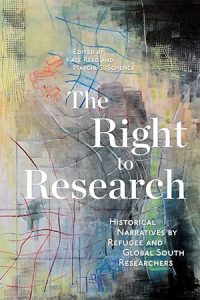The Right to Research: Historical Narratives by Refugee and Global South Researchers

Editor(s): Kate Reed & Marcia C. Schenck
Publisher: McGill-Queen’s University Press
Year of Publication: 2023
Print Length: 280 pages
Genre: Academic / Methodology & Methods, Non-Fiction / History, Migration & Refugee Studies, Social Science
Area: Africa, East Africa, Europe, Middle East, Kakuma Refugee Camp, Syria, Kenya, Rwanda, Yemen, Kurdistan
Topic: History, Research, Research Methods, Insider & Outsider Researcher, Bottom-Up Research, Refugees & Forced Migration, Asylum & Asylum Seekers, Global South, Ethics & Morality, Media & Narratives, Politics & Power, Representation
Refugees and displaced people rarely figure as historical actors, and almost never as historical narrators. We often assume a person residing in a refugee camp, lacking funding, training, social networks, and other material resources that enable the research and writing of academic history, cannot be a historian because a historian cannot be a person residing in a refugee camp. The Right to Research disrupts this tautology by featuring nine works by refugee and host-community researchers from across Africa, Europe, and the Middle East.
Identifying the intrinsic challenges of making space for diverse voices within a research framework and infrastructure that is inherently unequal, this edited volume offers a critical reflection on what history means, who narrates it, and what happens when those long excluded from authorship bring their knowledge and perspectives to bear. Chapters address topics such as education in Kakuma Refugee Camp, the political power of hip-hop in Rwanda, women migrants to Yemen, and the development of photojournalism in Kurdistan. Exploring what it means to become a researcher, The Right to Research understands historical scholarship as an ongoing conversation – one in which we all have a right to participate.
Table of Contents
Preface: An Invitation — Kate Reed and Marcia C. Schenck
Acknowledgments
Introduction — Kate Reed and Marcia C. Schenck
PART ONE. CROSSING BORDERS: CRITICAL PERSPECTIVES ON REFUGEE AND MIGRANT EXPERIENCES
1. Fostering Education Services in Kakuma Refugee Camp — Gerawork Teferra
2. Dangerous Crossings: East African Women Refugees and Migrants Flee Home for Opportunities in the Gulf States — Muna Omar
3. Burundian Refugee Drummers: Practitioners of a Longstanding, Yet Ever-Changing, Tradition — Aime Parfait Emerusenge
PART TWO. CULTURES IN MOTION: CONTINUITY AND CHANGE IN DISPLACEMENT
4. The Impact of Displacement on Twa Culture and Tradition — Richesse Ndiritiro
5. On Hip-Hop and Mental Migration — Alain Jules Hirwa
6. The Oral History of Local Photojournalism in Kurdistan — Lazha Taha
PARH THREE. IDENTITY AND (UN)BELONGING: CONSTRUCTING AND DECONSTRUCTING SOCIAL IDENTITIES
7. “Traditional Healers Save Lives”: The Changing Relationship between Traditional Healing and Modern Medicine in Rwanda — Phocas Maniraguha
8. Until New Dawn … New Day: The Development of Gender Awareness across Generations in Syria — Ismail Alkhateeb
9. The Impact of Migration on Intore Traditional Dance — Sandrine Cyuzuzo Iribagiza
10. Conclusion — Ismail Alkhateeb, Sandrine Cyzuzo Iribagiza, Aime Parfait Emerusenge, Alain Jules Hirwa, Phocas Maniraguha, Richesse Ndiritiro, Muna Omar, Marcia C. Schenck, Kate Reed, Lazha Taha, and Gerawork Teferra
Contributors
Index

Kate Reed is a PhD student in Latin American history at the University of Chicago. She holds an MPhil in economic and social history from the University of Oxford and an A.B. in history from Princeton University, where she began working for the Global History Lab in 2017. Before beginning graduate study, she was a teaching fellow for Global History Dialogues in its first two iterations. Kate’s research concerns questions of labor, development, and citizenship in modern Mexico and Central America. At present, she is working on a social history of Yucateco and Maya refugees in Belize (then British Honduras) during the second half of the nineteenth century. The project considers how these refugees both shaped, and were integrated into, systems of land tenure, labor control, and governance. Her broader research interests include questions of development, state formation, and debt in twentieth century Mexico; histories of welfare and welfare states; and migration/refuge in global context. She is co-editor of The Right to Research.
Source: https://carleton.ca/lerrn/people/kate-reed/ & https://plas.princeton.edu/people/kate-reed-%E2%80%9919
More from Kate Reed in this library, click here.

Marcia C. Schenck is Professor of Global History at the University of Potsdam. Her research commitment is the study of Africa and Africans as an integral part of writing global history. Her research interests include the history of migration and processes of refuge seeking, labor history, education history, oral and life history, African and global history and the history of international organizations. She received her Ph.D. in history at Princeton University in September 2017, and hold an M.Sc. in African Studies from the University of Oxford. Her dissertation, Socialist Solidarities and their Aftermath: Histories and Memories of Angolan and Mozambican migrants to the German Democratic Republic, 1975-2015, traces the lived experience and memories of Angolan and Mozambican migrants to East Germany and back. Her peer-reviewed articles have appeared in Africa, African Economic History, Labor History, Stichproben, and Atelier.
Source: https://www.marciacschenck.com/
More from Marcia C. Schenck in this library, click here.
